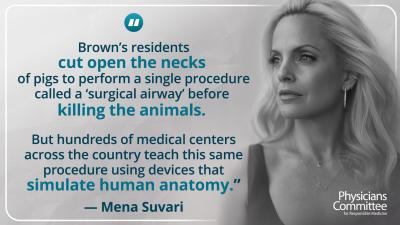Plant-Based Doctor Debunks Meat Myths in Debate in Leading Nutrition Journal
Experts Debate Consumption of Animal Products in AJCN’s Great Debates in Nutrition

Should people avoid animal products to reduce the risk for chronic disease and achieve optimal health? Experts are weighing in on the debate in new papers published in the American Journal of Clinical Nutrition.
In the debate’s main argument, Neal Barnard, MD, FACC, president of the Physicians Committee for Responsible Medicine, presented evidence showing that animal products are harmful to human health, while plant-based diets lead to sustained good health.
Dr. Barnard argued that the consumption of animal products exposes humans to harmful constituents of these foods—including saturated fat, cholesterol, lactose, estrogens, and pathogenic microorganisms—while displacing fiber, complex carbohydrates, antioxidants, and other healthful components of plant-based foods. In the process, consumption of animal products increases the risk for cardiovascular disease, cancer, diabetes, obesity, and other health problems.
“Individuals consuming animal products have considerably higher risk of serious diseases, compared with people who avoid them,” wrote Dr. Barnard.
Dr. Barnard shared evidence showing that those eating plant-based diets see long-term benefits to their health. He pointed to studies showing that plant-based diets have been linked to a healthy weight, reduced risk for cancer, reduced risk for cardiovascular disease, and reduced risk for type 2 diabetes. Dr. Barnard pointed out that while some diets improve certain health markers short term, plant-based diets improve many aspects of health long term.
“Avoiding animal products is the surest way to simultaneously improve body weight, glycemia, LDL cholesterol, and blood pressure,” wrote Dr. Barnard.
Dr. Barnard also debunked common myths about meat throughout the debate, including the following:
- Myth 1: Plant-based diets are deficient in nutrients: “Clinical trials do not show that adopting a vegan diet leads to deficiencies. The reverse is true; a diet emphasizing plant-based foods helps rectify the deficits of fiber, potassium, and various vitamins that often occur with omnivorous diets.”
- Myth 2: Hunter-gatherers were free of disease: “The romantic notion that hunter-gatherers have been free of ‘diseases of modernity’ was contradicted by the extensive atherosclerosis found in autopsies of Masai individuals and in ancient Inuit remains.”
- Myth 3: Plant-based diets lack protein: “Protein requirements in children and adults are easily met by a diet of legumes, vegetables, grains, and fruits. According to the WHO, ‘Protein deficiency is almost always accompanied by inadequate energy intake...,’ meaning the problem is a lack of food, not a lack of meat.”
Founded in 1985, the Physicians Committee for Responsible Medicine is a nonprofit organization that promotes preventive medicine, conducts clinical research, and encourages higher standards for ethics and effectiveness in education and research.







